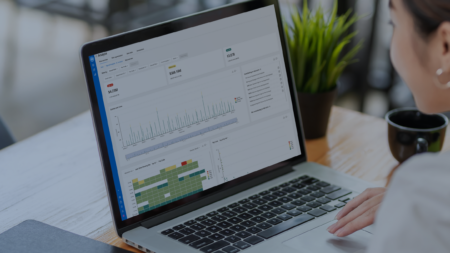When thinking of financial auditing, many see it as a difficult process with a lot of sensitive data and potential issues along the way. There’s no shortage of technologies meant to help auditors, yet the process doesn’t always feel easy. Anomalies in data, inaccuracies, and even subtle fraud attempts are all things traditional audit methods can sometimes overlook.
Artificial intelligence (AI) started with small applications, like generating some text or images, but we’re now seeing it at work in various industries. Can AI and auditing truly work together? Should we trust such a new technology, with so many uncertain variables still, with the type of sensitive data you handle during a financial audit?
The short answer is yes. When used correctly, AI can greatly benefit auditors, reducing the risk of errors and improving financial fraud detection. This article will help you understand what role AI can play in auditing, how to get the most out of this technology, what challenges exist, and how to approach them.
Introduction to AI in Auditing
Artificial Intelligence (AI) refers to the development of computer systems that can perform tasks typically requiring human intelligence. These tasks include understanding language, recognizing patterns, solving problems, and making decisions.
How do AI and auditing work together? Traditionally, auditing is a labor-intensive domain that involves verifying financial statements, assessing risks, and providing assurance on financial reporting.
Many repetitive tasks also require manual gathering, sorting, and analysis of vast quantities of data. AI can help make these processes faster and more accurate and is capable of handling a greater volume of data.
AI doesn’t replace auditors, as they will still need to check all the results and ensure the integrity and transparency of the process. However, with AI, auditors can detect anomalies, identify patterns, and assess risk more effectively, all while reducing the likelihood of human error.
Benefits of AI in Auditing
Using AI in auditing helps improve productivity, efficiency, and accuracy, gives you real-time insights, and enhances risk assessment. Here’s how.
Improved Efficiency and Productivity
One of AI’s most critical benefits in auditing is its ability to handle routine tasks that auditors previously performed manually. AI can help automate processes like data extraction, transaction testing, and document review that would otherwise take a lot of time and effort.
This way, auditors have more time for higher-order analysis and problem-solving, which improves productivity and overall audit quality. This efficiency gain is especially critical in financial auditing, where accuracy and timely reporting are essential.
Enhanced Accuracy and Risk Assessment
AI systems are great at analyzing vast datasets, identifying trends, and spotting anomalies that would be nearly impossible for humans to detect manually. Machine learning algorithms can sift through large quantities of financial data to uncover irregularities, highlighting potential fraud risks or compliance issues early in the process.
This increased accuracy not only lessens the risk of errors but also allows auditors to perform more in-depth risk assessments. Early risk identification helps auditors take proactive steps, improving the reliability of financial reporting.
Real-time Insights and Continuous Auditing
With traditional auditing methods, reviews are often retrospective, looking back over completed financial periods. AI systems can provide continuous auditing through real-time monitoring of financial transactions.
This allows auditors to better understand the organization’s financial health and notice patterns, trends, and outliers as soon as they occur.
AI Applications in the Audit Process
AI introduces advanced tools and techniques to the auditing process, streamlining data analysis, enhancing accuracy, and enabling continuous monitoring.
Data Analysis and Pattern Recognition
AI’s ability to analyze vast amounts of data is improving how auditors approach data-intensive tasks. Machine learning models, for instance, can easily examine large datasets, identifying trends and outliers.
Pattern recognition algorithms can pinpoint deviations from expected norms, such as atypical transaction sizes or unusual patterns in financial statements, which may require closer scrutiny.
Automated Document Review
One of the most practical applications of AI in auditing is automated document review, which involves analyzing contracts, financial statements, and other documents. AI-powered tools can classify documents, extract relevant data, and even assess contractual clauses for compliance and risk factors.
Natural language processing (NLP) is also useful here. It allows AI systems to understand and interpret human language, which further helps with document review tasks.
Predictive Analytics and Forecasting
AI’s predictive capabilities can make a huge difference in financial auditing. Machine learning models can analyze historical data to forecast future financial trends, giving auditors a head start in identifying potential risks.
For instance, predictive analytics can forecast revenue fluctuations, liquidity issues, or even market shifts that could impact an organization’s financial health. These insights allow auditors to provide more forward-looking assurance, helping businesses better prepare for the future.
Challenges and Considerations
Using AI in auditing has many benefits, but the process also has challenges and risks.
Data Quality and Availability
AI systems need high-quality data to work well, but ensuring this quality is often challenging. Financial data, for instance, comes from various sources, each with its own format and standards.
Inconsistent or incomplete information can compromise the accuracy of AI algorithms. Auditors will also need to ensure they can integrate data from various systems in a unified standard while ensuring data privacy.
Ethical Considerations and Bias
While AI has tremendous potential, it is not without ethical risks. Algorithms can inadvertently introduce biases into audit results if they rely on skewed data or are designed without considering fairness.
Auditors and AI developers need to ensure that AI systems offer transparency and impartiality. Human oversight in AI-powered auditing is essential to ensure ethical compliance and accuracy. Human auditors will need to take time to interpret AI outputs and question results before drawing conclusions to avoid errors or bias.
Skills Gap and Training
To use AI and take advantage of all its benefits, auditors need to undergo extensive training to address the skill gaps. Depending on the AI system they’ll use, they may need to gain an understanding of data science and even machine learning.
The Future of AI in Auditing
AI, as is, can greatly improve financial auditing. But what can we expect to see in the future?
Emerging Technologies and Trends
Twenty years ago, having a mini-computer in your pocket was a weird, albeit not impossible, idea. Now, we just refer to it as our “phone”. AI trends are in a similar spot. We know the technology has great potential, but we’re still far from reaching it.
An interesting AI technology that could boost auditing is natural language generation (NLG), which we could potentially use to generate intricate auditing reports.
Other technologies, such as robotic process automation (RPA) and advanced analytics, are also expected to complement AI in enhancing the audit process. Other applications and technology we might soon see range from more accurate fraud detection to increasingly sophisticated predictive modeling.
Regulatory Landscape and Standards
As AI becomes more integrated into auditing, regulatory bodies will introduce standards to govern its use. Currently, auditing standards do not fully account for the complexities introduced by AI systems, which could pose compliance challenges.
Traditional Auditing vs. AI-Powered Auditing: A Comparison
As auditing processes evolve, it’s crucial to understand how traditional methods compare to AI-powered solutions. This table highlights the key differences, illustrating AI’s transformative potential in the field of financial assurance.
| Aspect | Traditional Auditing | MindBridge’s AI-Powered Auditing |
| Data Analysis | Limited to sampling | Analyzes 100% of transactions, uncovering risks even in large datasets with multi-variable complexity. |
| Risk Assessment | Based on human judgement | Enhanced by AI algorithms with multi-dimensional risk scoring for more precise predictions. |
| Anomaly Detection | Manual review of samples | Automated, continuous detection of subtle patterns and anomalies |
| Efficiency | Time-consuming manual processes | Streamlined workflows through automation, enabling faster results and focus on strategic insights. |
| Fraud Detection | Limited by human capacity | Improved ability to identify fraudulent activities |
| Continuous Monitoring | Periodic audits | Potential for real-time, 24/7 auditing |
| Data Processing | Based on human judgment | Can process large volumes of data quickly, providing actionable insights in as little as minutes |
| Professional Skepticism | Relies on human judgment | Augments human judgment with unbiased, data-driven analysis to challenge assumptions effectively. |
| Focus of Auditors | Routine tasks and analysis | Transitioned to investigating flagged risks, interpreting insights, and providing strategic recommendations. |
Implementing AI in Auditing: Best Practices
AI comes with both benefits and challenges, but how can you implement it in your auditing processes? Here are a few best practices to help you get started.
Developing an AI Strategy
You can’t implement AI without a strategic approach. Start by defining your objectives for AI in auditing and identify areas where the new technology can add the most value.
A well-planned AI strategy aligns with business goals, addresses specific audit needs, and includes considerations for scalability and long-term maintenance.
Ensuring Data Quality and Governance
Data quality and governance are critical to effective AI use in auditing. Strong data management practices, including data cleansing, access controls, and regular audits of data sources, help create reliable and accurate AI outputs.
Auditors should work closely with data teams to maintain data integrity and implement data governance practices that meet regulatory requirements.
Fostering Collaboration Between Humans and AI
AI can augment human capabilities, but it is not a replacement for human judgment. We need a collaboration between humans and algorithms to correctly interpret and apply AI-generated insights. Auditors must understand the limitations of AI and know when to intervene if they want to maximize the technology’s benefits in auditing.
Ensuring a Strategic Approach to AI Integration
Before implementing AI in auditing, it’s crucial to assess your organization’s readiness. A comprehensive evaluation can help identify technological gaps, workforce preparedness, and alignment with strategic goals, ensuring a smoother transition. The MindBridge AI Readiness Assessment provides a detailed checklist to help your internal audit team evaluate key factors such as data accessibility, internal control frameworks, and cost efficiency. By addressing these areas, this tool empowers organizations to unlock AI’s full potential while ensuring its adoption is both effective and aligned with long-term objectives.
Embracing AI for the Future of Auditing
Looking at the current trends, we can be certain AI will have a major impact on auditing processes. From improving efficiency and accuracy to enabling real-time insights, AI offers auditors a powerful tool for navigating an increasingly complex financial landscape.
Since AI is not without challenges, auditors and organizations need to carefully plan their adoption of this new technology. That way, they can improve auditing quality, increase efficiency, and find inaccuracies and other issues faster without compromising data privacy or introducing biases.
AI for Auditing FAQs
1. What are the main benefits of using AI in auditing?
AI significantly improves efficiency and accuracy, automates routine tasks, and provides real-time insights into financial transactions. This allows auditors to focus on strategic analysis, risk mitigation, and improving overall audit quality.
2. How does AI improve fraud detection in auditing?
AI can process 100% of financial transactions, identifying anomalies and patterns that could indicate fraudulent activities. It uses advanced algorithms to detect irregularities that traditional sampling methods might miss, enabling early detection and proactive fraud management.
3. What skills do auditors need to work effectively with AI?
Auditors should develop skills in data analysis, machine learning fundamentals, and an understanding of AI-powered auditing tools. Additionally, they need strong interpretive abilities to critically evaluate AI-generated outputs and align them with professional judgment.
4. How can organizations ensure the ethical use of AI in auditing?
Ethical AI use begins with the implementation of transparent, unbiased algorithms and strong data governance practices. Human oversight is essential to validate AI outputs, ensure compliance with ethical standards, and address any biases in data or outcomes.
5. What are the potential challenges of implementing AI in auditing processes?
Organizations may encounter challenges such as ensuring high-quality data, addressing potential biases in AI systems, bridging skills gaps within audit teams, and adapting to an evolving regulatory landscape. Careful planning, training, and collaboration with AI providers can mitigate these risks.
6. Can AI replace auditors in financial audits?
No, AI is not a replacement for auditors. Instead, it serves as a powerful tool that enhances their capabilities. AI automates repetitive tasks and provides data-driven insights, enabling auditors to focus on strategic decision-making, fraud investigation, and delivering higher-value assurance.
7. What are some real-world applications of AI in auditing?
AI is being used for continuous monitoring of transactions, automated document review, predictive analytics, and advanced anomaly detection. For instance, it can analyze patterns in large datasets to identify risks, flag unusual journal entries, and predict financial trends with precision.
8. How can organizations measure the success of AI implementation in auditing?
Success can be measured by evaluating key performance indicators (KPIs) such as improved audit accuracy, reduced manual workloads, faster risk identification, and enhanced compliance with financial regulations. Organizations should also assess employee adoption and feedback to ensure smooth integration.



